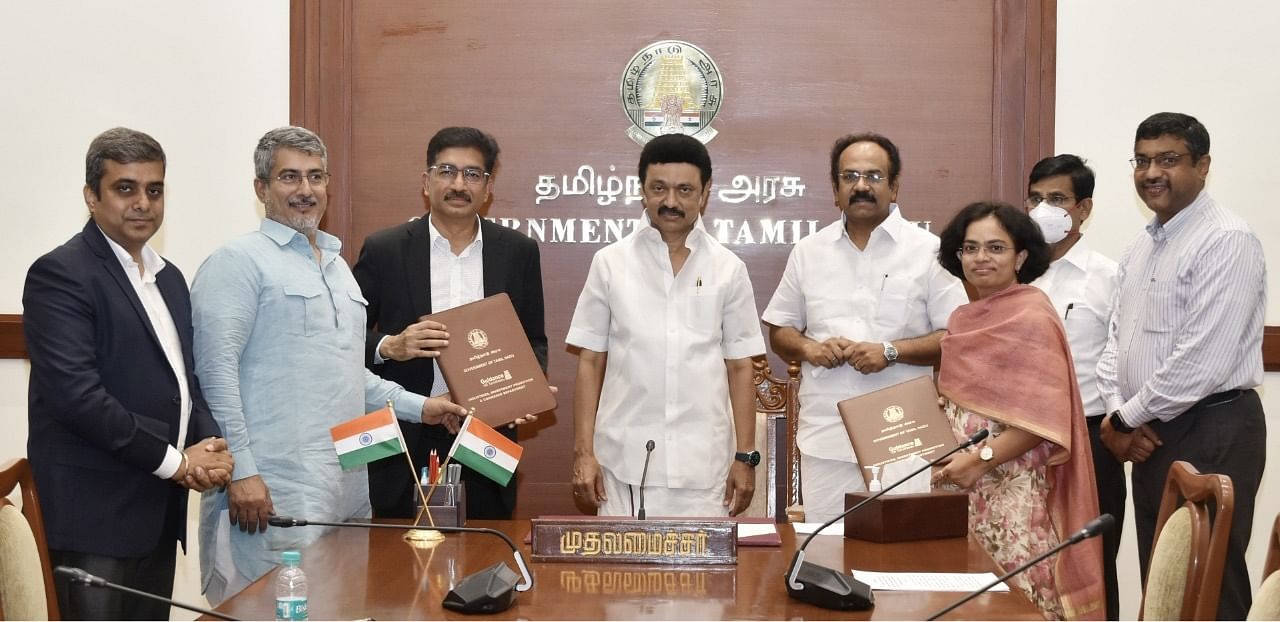
Singapore-based IGSS Ventures will build a semiconductor hi-tech park which includes a fab unit in Tamil Nadu at an investment of Rs 25,600 crore, in a shot in the arm for the state government that is wooing major players in the sunrise sector to set up their shops.
While the semiconductor fab unit will generate employment for 1,500 persons, the ecosystem that supports the Outsourcing and Testing Semiconductors (OSATS) facility to come up at the park will provide jobs for about 25,000 people.
Highly-placed sources told DH that the hi-tech park will come up near Chennai, the state capital, in an area of 300 acres. “Guidance Tamil Nadu and IGSS Ventures are working together to identify the location,” a top source said.
A Memorandum of Understanding (MoU) between IGSS Ventures and Guidance Tamil Nadu for setting up the massive unit was signed on Friday at the Secretariat in the presence of Chief Minister M K Stalin.
The development comes a week after the Tamil Nadu government held talks with the top management of Foxconn, which manufactures high-end Apple iPhones at its facility in Sriperumbudur, on the latter’s plans to invest in semiconductor and electric vehicle segments.
Besides Foxconn, the Tamil Nadu government has invited Samsung and home-grown Tata Electronics (OSAT) to invest in the state. Tata is in talks with several states, including Tamil Nadu, which is believed to have proposed Coimbatore as the location for the company’s first fab unit.
An official statement from the government said IGSS Ventures will launch its semiconductor fab under the name ‘Project Suria’ as it has applied for the Centre’s Rs 76,000-crore production-linked incentive (PLI) scheme for semiconductor manufacturing in India.
“The company plans to invest Rs 25,600 crore in the next five years providing jobs to 1,500 persons. Since the park will have a facility of Outsourcing and Testing Semiconductor (OSATS) among others, the ecosystem that supports these facilities will provide jobs to an additional 25,000 people,” the statement said.
Tamil Nadu believes it is well-poised to attract major investments in the sector as it houses some of the major automobile companies in the country and accounts for 20 per cent of national production in electronics and hardware.
B Murali Manohar Rao, Vice President (Strategy), Sankhya Technologies, told DH that Tamil Nadu can assume the leadership role in the sector due to a slew of factors like the state’s pro-industry policies, easy availability of land, the ecosystem that gets created automatically when the new industry comes up, and the automobile industry.
“The pandemic has demonstrated the importance of electronics which led to a shortage of computer chips and semiconductors. There is tremendous scope in the electronics space. The skilled workforce and large talent pool that Tamil Nadu offers are irresistible for any company. Even the attrition rate is very low in the state,” he said.
Rao also suggested that several facilities of the automobile industry can also be repurposed and used for assembling semiconductor fabs.
IGSS Ventures is a Singapore-based technology firm that enables the development and commercialisation of disruptive hybrid semiconductor technologies that go beyond Moore’s Law, according to its website.
Tamil Nadu believes it is well-poised to attract major investments in the sector as it houses some of the major automobile companies in the country and accounts for 20 per cent of national production in electronics and hardware.
Industries Minister Thangam Thennarasu had told DH in an interview in January that the state has touched base with several companies to produce chips in the state. “Since Foxconn is a major electronics manufacturer, we have formally invited them to invest in the semiconductor sector. The company has been doing business here for over a decade and they know the state well,” Thenarasu had said.
Tamil Nadu, which released an exclusive policy for electronics and hardware manufacturing in 2020, aims to contribute 25 percent of India’s total electronic exports to the world and increase the industry's output to $100 billion by 2025.